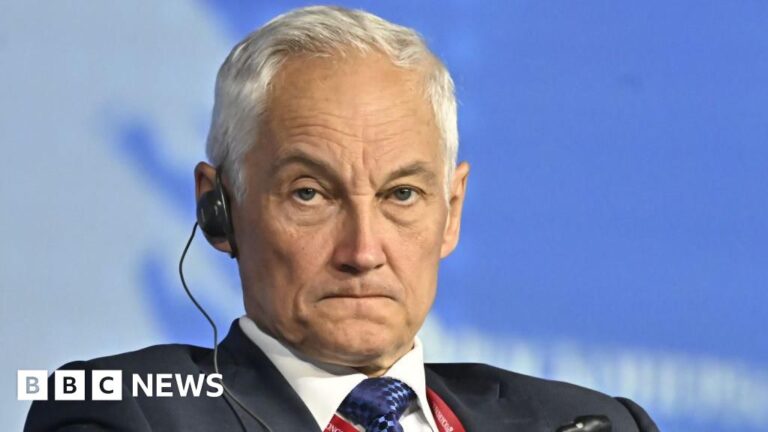- author, Laura Gozzi
- role, bbc news
Russia has a new defense minister for the first time in 12 years.
On May 12, the Kremlin announced that President Vladimir Putin had nominated economist Andrei Belousov to replace longtime Defense Minister Sergei Shoigu.
Although there had long been rumors that personnel changes were being considered, few expected Mr. Putin to replace Mr. Shoigu with a civilian with no background in either the military or the security services.
Andrei Removich Belousov was born in Moscow on March 17, 1959 to Rem, an economist, and Larisa, a radiochemist.
He received a degree in economics from Moscow State University in 1981 and pursued a career in academia for many years. He began working as an advisor to the Russian Prime Minister in the late 1990s and at the same time pursued his Ph.D., which he received in 2006.
He was appointed Minister of Economic Development in 2012. The following year, he became a close ally of Mr. Putin.
In 2020, he was appointed First Deputy Prime Minister of Russia. He has since developed a reputation as a supporter of President Vladimir Putin, reportedly being the only member of the president's “economic inner circle” to support Russia's annexation of Crimea in 2014. .
He is also credited with devising some of the major economic ideas pursued by the Kremlin in recent years, and was a key figure behind a series of ambitious plans adopted by Mr Putin as he bid for a fourth term in office in 2018. He is considered one of the ideologues.
He was also a key proponent of raising the value-added tax from 18% to 20% in 2019.
Belosov is known as a hard-liner who protects state interests over corporate interests. He has long advocated tougher regulation, increased government investment and a broader state presence in the economy.
In 2018, a letter was leaked in which Belousov proposed seizing excess profits from 14 major metallurgical and chemical companies.
This proposal received widespread criticism. The Russian Federation of Industrialists and Entrepreneurs warned that this would lead to a wave of bankruptcies, and although the proposal was not implemented, it caused a stock market slump.
In 2021, the metallurgical company's share price collapsed again after Belousov said the metallurgists had “extorted” around 100 billion rubles (about £870 million) from the state.
These efforts may have been unpopular, but they were consistent with Belousov's core belief that the economy is driven by state involvement.
Konstantin Sonin, a Russian economist and professor at the University of Chicago, told the BBC that Belosov strongly believed that “innovation happens because governments invest in innovation, and economic growth happens because governments force companies to invest.” He said he is doing so.
These beliefs are consistent with Putin's state-controlled, isolationist worldview, Sonin added.
Kremlin spokesman Dmitry Peskov said the proposed civilian appointment showed the need for “innovation” in the role of defense minister.
“Those who are more open to innovation will win on the battlefield,” he said.
As defense minister, Belosov will have to manage Russia's military spending, which will account for around 36.6 trillion rubles (about £324 billion), or about 30% of Russia's budget, in 2024.
Russia's Komsomolskaya Pravda newspaper commented on the appointment that Belousov's economic expertise and understanding of industrial sectors, including defense, make him well-suited to manage the military's large budgetary requirements.
Belosov's appointment comes as Russia's war in Ukraine enters its third year and appears to signal that Putin is preparing for a long and costly war.
Belosov's task is to ensure that Russia's economy can continue to maintain its military apparatus despite Western sanctions.
The Kremlin will also hope that Belousov's experience as an economist will help make military spending more efficient and reduce corruption.
His well-established interest in high-tech weapons such as drones, which require a near-constant supply for Russia to continue attacking Ukraine, will also help.
In 2023, Belosov announced plans to produce 18,000 large and medium-sized drones in 2024, as well as the launch and development of a new industry: the production of unmanned aerial systems.
Russian media reports that Belosov, who is married and has one child, Pavel, born in 1994, is not known to have profited from corruption and is not particularly corrupt, so the Russian government He pointed out that he was ranked lower than the average person among his colleagues. Luxurious lifestyle.
Like President Putin, Belousov is close to the Russian Orthodox Church. It is believed that he was baptized in 2007.
Like Putin, he is a martial arts enthusiast and is said to have practiced karate and the Russian martial art sambo in his youth.
Additional reporting by Vitaly Shevchenko

